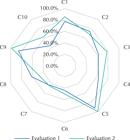ABSTRACT
OBJECTIVE
To analyze the effect of a multifaceted intervention in the care of pregnant women with syphilis in primary health care.
METHODS
This is a quality improvement project performed in 26 basic care units in the municipality of Rio de Janeiro, between January and December 2017. It has a quasi-experimental mixed design, with previous, later and time series analyses. We evaluated the care provided to all pregnant women with syphilis whose prenatal care that ended during the studied period, using ten quality criteria and one indicator. The intervention was multifaceted, covering permanent education, improvement of records and information systems, audit and feedback, patient education, organizational changes and work processes. We estimated absolute and relative improvements of the criteria and their statistical significance (α = 5%). The facilitators and hinders of the intervention were analyzed according to the Model for Understanding Success in Quality.
RESULTS
After the intervention, there was a total absolute improvement of 6.7% (64.4% versus 71.0%) and relative of 28.8% (p > 0.05). Eight of the ten quality criteria had an improvement, which was significant in four of them (p < 0.05). The monthly indicator of adequate treatment also improved (p < 0.05), but maintained low performance throughout the project. The increase in the compliance of the treatment scheme with the protocol (91.4% versus 99.1%) positively stood out, but the main opportunities for improvement were testing (42.8% versus 48.5%) and treatment of sexual partnerships (42.8% versus 44.2%). Regulatory pressures to improve the monthly indicator and the political-economic crisis experienced by the municipality modulated the effect of the intervention.
CONCLUSION
The project was useful to identify priorities and guide interventions to improve the quality of care for syphilis, although there is still ample room for improvement. The identified problems, as well as the contextual modulators of the effect, should be considered in future interventions.
Syphilis; Pregnancy; Quality Improvement; Quality of Health Care; Primary Health Care

 Thumbnail
Thumbnail
 Thumbnail
Thumbnail
 Thumbnail
Thumbnail
 Thumbnail
Thumbnail



 LCL: Lower control limit; UCL: Upper control limit.
LCL: Lower control limit; UCL: Upper control limit.